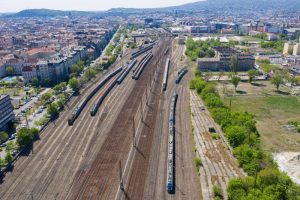 The Budapest Development Agency (BFK) has signed the contract for the feasibility study for Budapest new rail tunnel connecting the area of Déli pályaudvar with Nyugati pályaudvar. HUF 1.4 billion (EUR 4 million) is the value of the contract. The feasibility study must be completed within 18 months.
The Budapest Development Agency (BFK) has signed the contract for the feasibility study for Budapest new rail tunnel connecting the area of Déli pályaudvar with Nyugati pályaudvar. HUF 1.4 billion (EUR 4 million) is the value of the contract. The feasibility study must be completed within 18 months.
Fomterv Civil Engineering Design (Hungary), SMA und Partner AG (Switzerland) and UNStudio, a Dutch company is the selected consortium for the elaboration of the study which will cover all aspects of the route selection, conceptual railway scheduling for the whole region, engineering and construction feasibility, cost-benefit analysis including wider economic benefits and assessment of detailed construction costs, and an urban planning and design vision for the new stations and the unused railway lands beyond them.
“Huge step towards a new era of urban and suburban rail in Budapest. This long-term investment would create significant extra capacity for more rail services to Budapest from the suburban region and the major cities of Hungary and beyond,” David Vitézy, the CEO of Budapest Development Agency (BFK) said.
Fomterv Civil, who plans to design the railway infrastructure in Budapest, is responsible for the study. Swiss SMA und Partner will create the schedule concept for the construction of the railway tunnel and the practical implementation of infrastructure planning. The design and, architectural, urbanistic, and city design works will be performed by UNStudio.
The study will determine the investment costs and will identify the construction phases and will analyse the social and environmental impact as well as the city development potential and benefits.
Based on the study, a rail service vision will be created considering the suburban dimension and the potential of the rail development. As part of the work, a conceptual review of the railway infrastructure and transport services introduced to the South Railway Station and Western Railway Station will be carried out. Following the analysis, future transport services will be introduced that will connect the eastern and western Hungary to the Budapest centre, doubling the railway capacity in the capital’s area.
As part of the work, the future transport service of the Eastern railway station and the main infrastructure must also be defined. Currently, city’s railway network is served by stations which are creating bottlenecks that will be removed by providing additional capacity to reduce traffic congestion and harmful environmental factors. The study will review all transport routes in the South and Western stations and creating a future infrastructure for them.
There is no decision for the construction of Budapest new rail tunnel, but this will be adopted on the basis of the study after 2022.
The rail tunnel is needed to create additional capacity and to develop the capital’s suburban rail transport. The project is essential as in Budapest three trans-European railway corridors are crossing the Danube in one single place – on the southern part.
Budapest is committed to develop the railway transport in the suburban area and to increase the capacity to provide additional connections and better transport services. This will contribute to a sustainable development and the creation of an efficient and fast transport system.
David Vitézy has explained our readers the projects and plans intended to be carried out for the development of the Budapest transport system based on rail services.
Share on:



